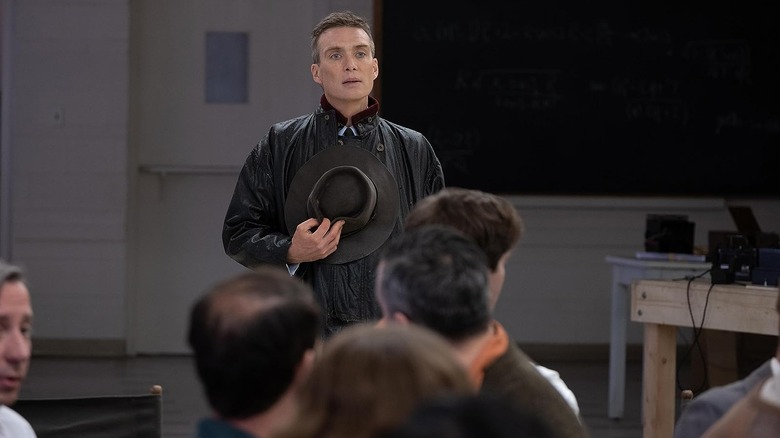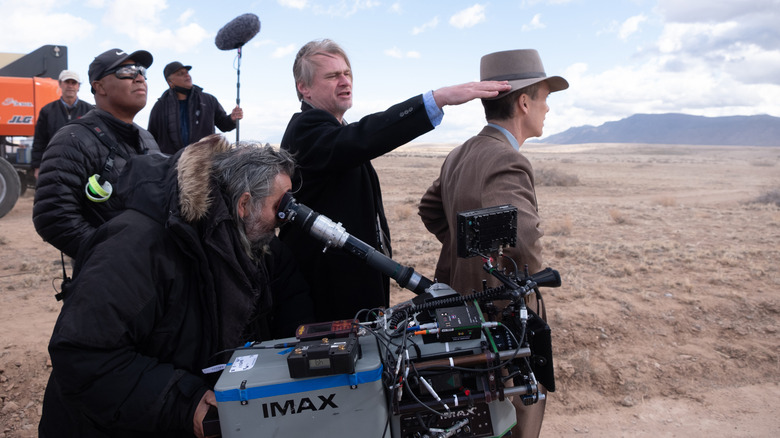If You Had A Hard Time Hearing Oppenheimer's Dialogue, You're Not Alone
What's the mark of a true Christopher Nolan movie? Multiple storylines edited together impeccably as they meld time and space? A focus on big-screen spectacle that makes audiences feel like they're right there amid the action? Both of those fit the director's sensibilities like a glove, but I'd propose another aspect entirely: Controversies ignited by moviegoers who are completely unable to hear certain lines of dialogue.
Okay, in all fairness, this narrative mostly only became a thing in the wake of "The Dark Knight Rises" in 2012, when all of humanity was ever-so-briefly united in sheer confusion over every word that came out of the mouth of Tom Hardy's Bane. Nolan notoriously tinkered with the sound mix for Hardy's dialogue between the release of the prologue sequence and the actual theatrical debut of the film itself, but the issue has popped up again in subsequent Nolan movies, such as certain portions of "Dunkirk" (which, coincidentally, featured a somewhat unintelligible Tom Hardy wearing a mask for almost all of his screen time) and basically the entirety of "Tenet." /Film's Ben Pearson even wrote a whole deep-dive into this dialogue problem and why it's grown far beyond Nolan and become something of an industry-wide bad habit.
Well, with the release of "Oppenheimer," Nolan is once again revisiting this issue and — incredibly enough — doubling down on it. As it turns out, there's a very good reason why the sound problem transcended us mere audiences and applied to the cast themselves. Those noisy IMAX cameras gave the actors quite a jolt on set, running the risk of drowning out all the dialogue recorded during filming. Conventionally, directors would resort to fine-tuning dialogue through ADR (automated dialogue replacement) but, as we all know, Nolan is anything but conventional.
Staying in the moment
What fun would it be to film a movie like "Oppenheimer" the easy way? As usual, Christopher Nolan insisted on filming in real historical locations that J. Robert Oppenheimer actually used and refused to resort to digital effects to recreate the Trinity atomic bomb test. But as with his previous movies, Nolan also made a point to avoid using ADR — a process by which, after principal photography is completed, actors return to a controlled, soundproof booth and rerecord their own dialogue that may have been drowned out by other ambient noise on the day of shooting.
This is an extremely common practice in both television and film, to be clear, but in an interview with Insider, Nolan opened up about his aversion to ADR ... even as he recognizes why some viewers might not be fans of that choice:
"I like to use the performance that was given in the moment rather than the actor re-voice it later. Which is an artistic choice that some people disagree with, and that's their right."
Admittedly, there's a certain logic to wanting to capture the authenticity and nuances of the direction he gave to actors on the actual day of shooting. Months removed from that, it can be difficult for actors to have to come into a sterile environment and attempt to give a similar voice performance (let alone the same exact one). Interestingly enough, Nolan was able to get away with this on "Oppenheimer" because of software advancements that allowed the IMAX camera noise to be filtered out in post-production. As Nolan told Insider, that "opens up for you to do more intimate scenes that you would not have been able to do in the past." A method to the madness!
"Oppenheimer" is currently playing in theaters.

